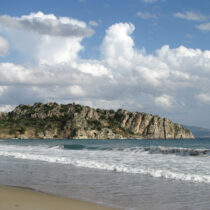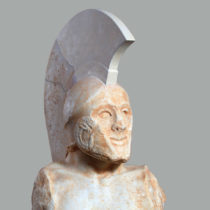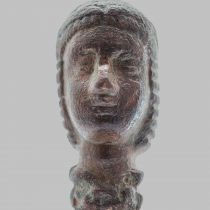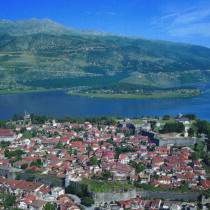Voices at Work: Women, Performance, and Labor in Ancient Greece
"Voices at Work" explores the complex relationships between ancient Greek poetry, the female poetic voice, and the practices and rituals surrounding women’s labor in the ancient world.
Video reveals potential ‘killer blow’ to King Richard III
Leicester University has revealed new film footage that for the first time details the potential killer blow that claimed the life of King Richard III.
Black Sea: Unity and Diversity in Roman Antiquity
The starting point of the BSUDRA Project is the identification of common cultural elements characterizing all regions surrounding the Black Sea.
Two skeletons in a tight embrace unearthed in Greece
Archaeologists in Greece have unearthed two skeletons locked in a tight embrace, among other finds, during excavations in the Diros Caves.
Divine Yet Human Epics: Reflections of Poetic Rulers from Ancient Greece and India
Shubha Pathak’s interpretative account concludes with a new way to connect Indian primary epics to their Greek analogues.
Noninvasive methods used in the study of historic Indian sword
Scientists and conservationists from Italy and the UK joined forces to study a curved single-edged sword called a shamsheer using classical and nondestructive techniques.
International Conference on the Ancient Novel 2015
ICAN V, the fifth international conference on the ancient novel and narrative is to be held in Houston, Texas, 30 September-4 October 2015, 39 years after the first ICAN in Bangor, Wales.
Power and Pathos: Bronze Sculpture of the Hellenistic World
The exhibition bring together approximately 50 ancient bronzes from the Mediterranean region and beyond ranging from the 4th century BC to the 1st century AD.
Traces of large-scale human-produced air pollution in Peruvian ice cap
Scientists have found the first detailed record of widespread human-produced air pollution in South America from before the industrial revolution...
Late Ottoman period shipwreck reveals its treasures
Part of the hull, wooden rigging-elements, pistol bullets, ceramics, glass tableware, bricks and an iron cannon were found by underwater archaeologists.
The child in the sand
Last Tuesday, on February 3rd, tour guide Carrie Brown was walking along the beach of Sanday island when she spotted part of a rib-cage in the sand.
Rapid end of the Green Sahara 8,000 years ago
9,000 years ago most of the Sahara was covered by large lakes and savannah that were populated by herds of wild game...
Amber fossil links earliest grasses, dinosaurs and fungus used to produce LSD
A perfectly preserved amber fossil from Myanmar has been found that provides evidence of the earliest grass specimen ever discovered and even then it was topped by a fungus similar to ergot, which for eons has been intertwined with animals and humans.
Prehistoric twins discovered in Russian cemetery
Archaeologists in Siberia discovered the oldest confirmed evidence of twins, when they unearthed a 7,700-year-old skeleton of a woman bearing twins, all of whom probably died at birth
Marble bust of Hadrian unearthed
A marble bust of Hadrian was excavated at the archaeological site of Los Torrejones, in Murcia, Spain.
Expedition reveals new Batavia burial site
Australian archaeologists are back at Beacon Island examining archaeological sites related to one of WA's most famous shipwrecks, the Batavia.
Menkaure Pyramid open to public
The pyramid of Menkaure, the smallest of the three at the Giza Necropolis, is now open to the public after renovation works were completed.
Neanderthals extinct from Iberian Peninsula earlier than thought
Findings at the El Salt site in Spain, show that Neanderthals disappeared from the Iberian Peninsula earlier than it was believed until now.
Nok Culture study enters its third round
Excavations in Nigeria currently not possible. Frankfurt archaeologists do not want to take any security risks. Now the existing data will first be evaluated at home.
Polish student reconstructed houses of the first Egyptians
Jacek Karmowski prepared virtual 3D models of ancient Egyptian houses, based on the results of the Tell el-Farcha excavations in the Nile Delta.
The systematic excavation at the Peak Sanctuary of Vrysinas
The animal remains and zoomorphic figurines found at the peak sanctuary at Vrysinas open up a window to the Minoan world at around 1700 BC. They enable us to explore various aspects of the human-animal relationships.
In a crisis, the bigger your social network, the better
The more you know your neighbors, the better off you may be when disaster strikes, a new study from the University of Arizona suggests.
15-million-year-old mollusk protein “beautifully preserved”
A find which gives us a window back around 15 million years, which is about the same time the first mammoths appeared.
Narratives Across Space and Time: Transmissions and Adaptations
The Proceedings of the 15th Congress of the International Society for Folk Narrative Research) present the results of the works of the Congress, and contribute to the international narratοlogical research.




























